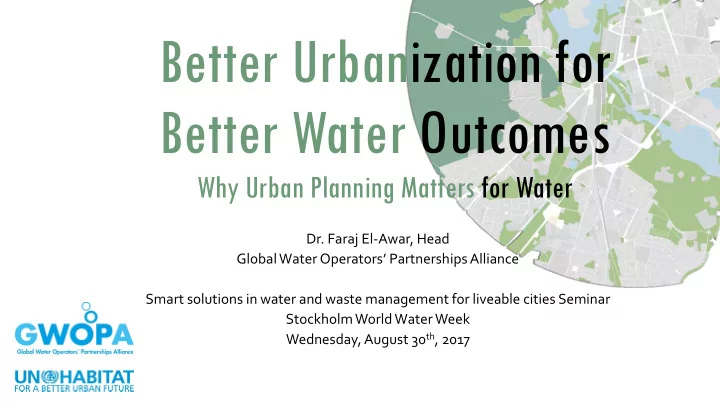

Better Urbanization for Better Water Outcomes Why Urban Planning Matters for Water Dr. Faraj El-Awar, Head Global Water Operators’ Partnerships Alliance Smart solutions in water and waste management for liveable cities Seminar Stockholm World Water Week Wednesday, August 30 th , 2017
“The battle for sustainability will be lost or won in cities..”
From Great Challenges to Great Opportunities
Urbanization Global Trends • 54% urban world • Pace 11x faster in Africa than Europe • Secondary Cities > Megacities • Population doubling 2010 – 2050 • Little good planning – laissez-faire results • Growing socio-economic inequalities • Inordinate consumption footprints • Inordinate economic value https://www.theguardian.com/cities/2015/nov/23/cities-in-numbers-how-patterns-of-urban-growth-change-the-world#img-1
Urbanization Global Trends SPRAWL Key Facts • To 2050, land consumed at 2.5x Population Growth • Driven by private>public interest Implications for Water • Increased per capita infrastructure costs • Increased resources consumption (water + energy) • Lost in transmission • ‘watering the lawn’ • Destruction of ecologically significant land • Foreclosing on nature based solutions • Increased car use • More pavement, Reduced infiltration • Increased cc inducing ghg emissions
Urbanization Global Trends SLUMS Key Facts • Poor construction, insecure tenure, cramped conditions, lack of services • Typified by poverty and precarity • Urban Africa close to 70% slums Implications for water Costly, risky and physically challenging to serve Environmentally precarious • risk to residents health and safety • Ecological services
Urbanization Global Trends FRAGMENTATION Key Facts Spatial fragmentation of natural systems, land uses and classes Implications for Water Loss of ecosystem function Social acceptance of spatial Global Trends in Urban Form injustice – (Muthaiga vs Mathare) Entrenchment of social divides
Why Does Urban Form Matter for Water? Urban form and infrastructure choices lock in socially, environmentally and economically unsustainable water outcomes and diminish the potential of cities to serve as solutions to water challenges.
Planning Principles that Favour Water Outcomes • Compact and Contained Urban Form Effective planning City level • Preservation of Natural Spaces • Intensification of urban nodes enables positive • Landscape mosaic water outcomes • Mixed-use • Permeability • Capture and reuse resources and technologies • Nature-based infrastructure Site level • semi/de-centralization
Contemporary Integrates sectors Considers all scales Planning Practice… Participatory Inclusive Strategic More than a technical tool Embraces Sustainability long time frames Social, enviro & financial
The New Urban Agenda Global and the SDGs Local
Water Actors moving the New Urban Agenda forward • Embrace the opportunities of cities • Beware the Buzzwords! • Engage in PLANNING • Go beyond your sector • Seek local solutions to global challenges • Share solutions with others! • Leave no one Behind
Thank you
Recommend
More recommend